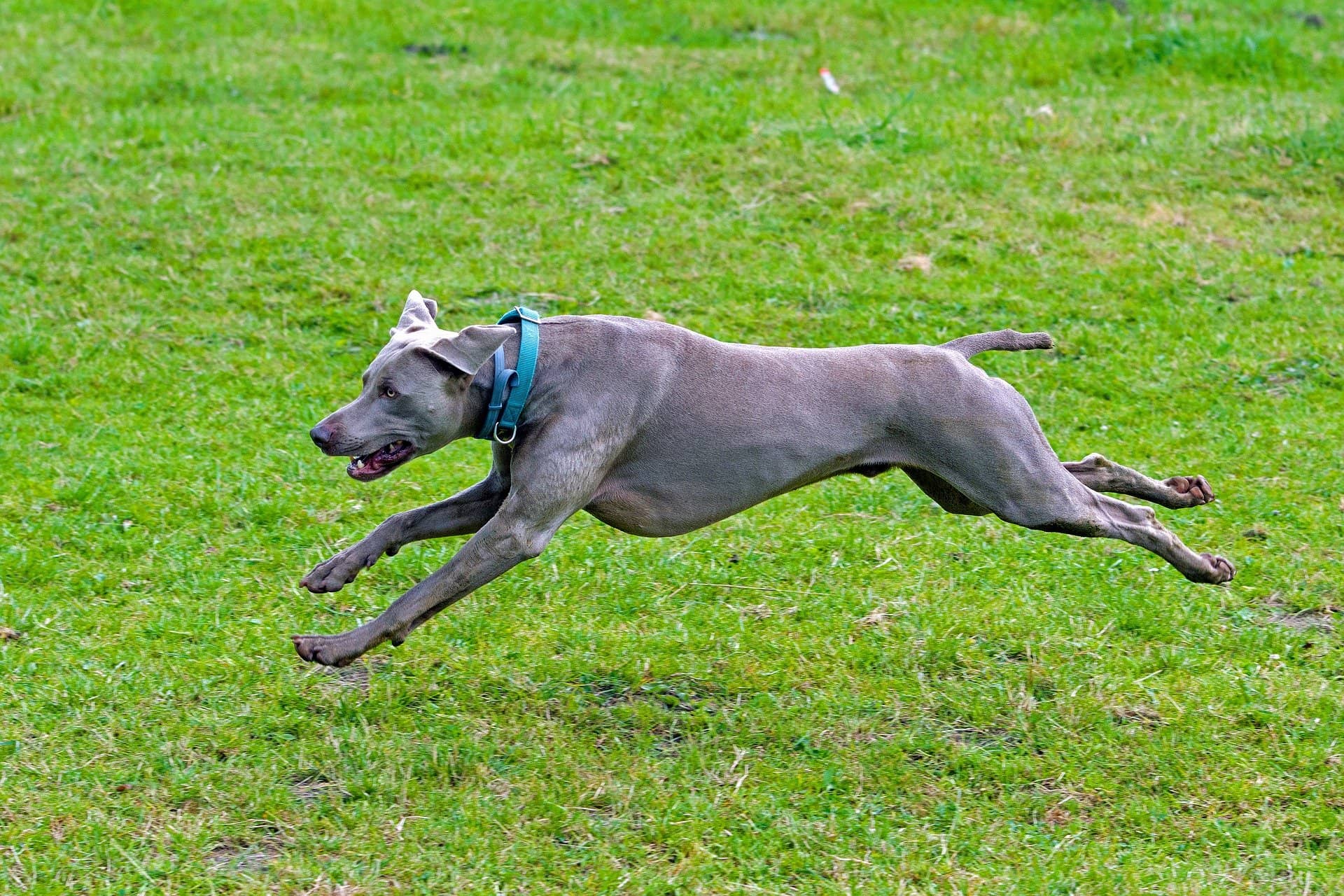Weimaraner Residential Training
Weimaraners are lively, clever gundogs with boundless energy and keen minds. Originally bred to help hunters find and retrieve game, they are ranked in the top ten most popular gundog breeds in the UK. They are energetic and intelligent, requiring lots of exercise and stimulation. Luckily, they are also eager to please, which is why they thrive with tailored, consistent, engaging training. At Royvon, we’re excited to offer a specialised residential training programme designed specifically for Weimaraner puppies and adults.
Whether you want to channel your pup’s zest for life into positive behaviours or refine an adult dog’s skills, our bespoke residential dog training is perfect for creating a well-mannered, joyful Weimaraner. Join us to discover the joy of training your spirited ‘Silver Ghost’!
Identifying Your Weimaraner’s Training Needs
The Weimaraner’s dazzling energy and sharp wit aren’t just for show. In the 19th century, these dogs were bred to hunt large animals, like deer and boar – which is one of the reasons they demand a tailored approach to training. With vitality that could outlast even the most spirited of joggers and cleverness that rivals the seasoned puzzle-solver, Weimaraners are a breed that thrives under structured, dynamic engagement.
Their strong will and pronounced prey drive make them excellent hunting partners, but they can pose unique challenges in a typical home setting. They are often described as ‘velcro dogs’ due to their intense loyalty and desire for constant companionship. Their clinginess can make them highly sensitive and prone to separation anxiety and other behaviour issues if not properly socialised and trained. Specialised training can transform their potential stubbornness into cooperation and channel their chase instincts into positive behaviours.
At Royvon, we understand the nuances of these dynamic dogs and tailor our programmes to meet their high standards of stimulation and interaction. Get in touch with us today to turn that energy into a harmonious blend of fun and discipline!


Our Weimaraner Training Philosophy
Our positive reinforcement techniques are perfectly suited to these lively and intelligent dogs. We focus on reinforcing the behaviours we want to see by using treats, praise, and play. These effectively turn training sessions into a fun game that satisfies their high energy levels, intellectual curiosity and hunting instincts.
By adapting our methods to match their spirited nature and sharp minds, we ensure that your Weimaraner learns quickly and enjoys every step of the training journey.

The Key Components to Our Weimaraner Training
Our training programme is designed to harness the innate spirit of your dog.
Physical Exercise
Our training includes vigorous exercise routines that satisfy their need to move and improve their overall well-being. From running to agility training, we make sure every session is an adventure that meets their physical needs.
Mental Stimulation
A sharp mind needs constant engagement. We spice up our training with puzzles and games that challenge their intellect. This keeps their minds as fit as their bodies, making sure they’re always ready for more.
Obedience Training
We lay a firm foundation with basic commands and then raise the stakes to advanced obedience, using their intelligence in a positive way. Our structured approach helps channel their enthusiasm into a willingness to follow commands.
Socialisation
Given their strong prey drive and cautious nature with strangers, we implement safe and gradual socialisation strategies. Our approach helps your Weimaraner learn to interact confidently and calmly with other pets and people, turning potential challenges into positive experiences.
The Benefits of Weimaraner Puppy Training
It is really important to start training Weimaraner puppies early. It allows us to tap into their key developmental stages, setting a foundation for lifelong good behaviour.
At Royvon, we introduce puppy learning with methods designed specifically for their sprightly and curious nature. Early socialisation is at the forefront, where pups learn to interact easily with various sounds, sights, animals and people, ensuring they grow up confident and well-adjusted.
Basic compliance starts with simple commands – sit, stay, come, catering to their growing attention spans. Weaving fun into each lesson keeps those wagging tails enthusiastic.
We focus on preventing future behavioural issues by encouraging good habits from the start. Through gentle guidance and consistent positive reinforcement, your Weimaraner puppy will develop into a well-mannered, joyful companion.


Training Results
We have training locations in Esher, Merthyr Tydfil, or Bridgend. In each of these centres, our focus is on tailored training and excellent results.
- Improved Recall and Compliance
- One area we concentrate on is producing significantly improved recall abilities. Whether in a busy local park or out in a field, your Weimaraner will learn to respond promptly to your calls every time. This, coupled with strengthened trust in various settings, means your walks can be as relaxed or as adventurous as you like with your well-behaved pal by your side.
- Behavioural Management
- We also focus on managing and redirecting typical Weimaraner traits, including their strong prey drive and occasional dominance tendencies. These instincts are channelled into positive behaviours through consistent and understanding training methods.
Residential Boarding During Training
Our residential training facilities are designed specifically for the comfort and safety of your four-legged friend. Our boarding options are designed to complement the training experience, ensuring that the routines and progress made during the day are reinforced with a secure and peaceful night’s rest.
Your Weimaraner will have spacious accommodation in our dog hotel and receive individual attention to make sure they are happy, relaxed, and ready for each new day of learning and fun. Our dog-loving staff work around the clock to keep your dog fed, safe and looked after just like at home. At Royvon, we’re all about making sure tails keep wagging during and after training!
Why Choose Royvon?
Simply put, we excel with high-energy, intelligent dog breeds! Our extensive experience means we understand how to channel your Weimaraner’s traits into positive outcomes.
Don’t just take our word for it – we have lots of testimonials from dog owners who’ve seen remarkable transformations. From unruly pups to perfectly poised dogs, we’re really proud of our success stories.
Start Your Weimaraner’s Training
Are you eager to start your Weimaraner’s training journey at Royvon? Enrolling is a breeze! Simply get in touch, and we’ll guide you through the process.
It has been very difficult for us to leave Riley in anybody else’s care because he requires experience and a controlled environment and we were blown away by how intuitively and confidently the team at Royvon took care of him and put our minds at ease. Millie who checked Riley out was fantastic too and had spent extra time with him that morning, and everybody we met on site was so responsive, kind and professional. It is life changing to know there is a place we can trust with a tricky but beloved dog, and we are looking forward to Riley building strong relationships with the team there. Thank you Tilly, Millie and all at Royvon!
Sisu absolutely loves it at Royvon and gets excited every time we pull into the car park!
From the moment we drop her off, we know she’s in great hands. The staff are professional, caring and clearly passionate about what they do.
Sisu always comes home happy, healthy and tired after enjoying days packed with play, training and love from the team :).
It gives us total peace of mind knowing she’s getting great care and we never hesitate to book her into Royvon when we’re going away.
We highly recommend Royvon!
I can now go on holiday knowing that my dog will be having a great time too.
Alfie and familyxx
Both Leo and Pippin had a great time at Royvon, staff all very pleasant and clearly love working with the dogs. The videos of the dogs out and about shows how happy they are whilst on their holidays. Wouldn’t hesitate to use Royvon again.
Over the last few months, Mimi has done a brilliant job of training both Gus and me and I cannot recommend her and Royvon highly enough. Gus responded to her immediately and tried so hard to do everything that she asked of him. Her patience and clear understanding of what Gus and I were struggling with was reassuring. The notes sent after each training session were so helpful and ensured that I was consistent with training between sessions. At 12 months old, Gus will now walk on a loose lead, check in with me before going to another dog and sit quietly as other dogs walk by. We have both loved every 1:1 session with Mimi and look forward to doing more training with her.
We dropped Maysie off for her initial assessment with Romeo all muzzled up to be safe. We spent approx an hour and a half with him, walked through his training routes including the town, playing fields and railway station. We watched some of the training techniques he would be using and then we left her there looking very sorry for herself. Within an hour of us leaving Romeo sent a video through of them both and Maysie was eating treats out of his hand - muzzle free.....we were absolutely gobsmacked! We visited again the 3rd day for a training seasion and then left her there for her residential. We received daily updates, photos and videos from the Royvon Team showing how she was improving and also enjoying additional playtime and socialisation with some of the other dogs.
When we returned to Royvon we had a 3 hour handover session with Romeo walking again through his training route. We were able to see how much Maysie had improved since our first visit and tried some of the techniques ourselves with guidance from Romeo. We then a further couple of hours with him again the following day before returning home with Maysie.
We have definitely seen positive improvements in her behaviour since she has been in training with Romeo and cared for by the Royvon team. She seemed to have taken really well to everybody there and had been giving them all her special Maysie cuddles by the time she left.
Over our first week at home we have been continuing to incorporate the training we have learned into our walks. It has been a bit of a challenging week transitioning back to home life but we are committed to putting the work in and Romeo has been keeping in touch with his invaluable guidance and support.
We have a follow up session booked in at the beginning of July and are confident that with the tools, guidance and additional support from Romeo and that Maysie will continue to improve and that these new behaviors she is learning will just become natural for her.
Romeo is undeniably passionate about his dogs in his care. He genuinely wants to achieve a positive outcome for both dogs and their owners. His professionalism, knowledge, understanding and empathy shown towards Maysie and his ongoing follow up support for ourselves has been nothing short of amazing. We can't thank Romeo and the Royvon team enough and look forward to returning back to visit in July.
Especially Tilly, Millie and Ella who looked after my German Shepherd Ralphy. It was so clear to see how loving, caring and attentive you all were with him … it truly made a difference.
When I got home, he was relaxed, happy and clearly well looked after. It’s a huge comfort knowing he’s in such good hands.
Thank you again for all the love you gave him.
I love getting the daily photo updates and seeing him playing with his friends. It’s such a relief knowing he’s in a safe and stimulating environment while I’m at work.
Highly recommend to any dog parent looking for peace of mind and a tired, happy dog at the end of the day!
Olive has just completed her three weeks intense training and it’s like we’ve brought home a different dog. Not only is she calmer in the house, but we can now walk her without her being petrified of every noise and person that comes near her. She’s even just walked the school run with me.
Romeo and the team at Royvon have been a godsend to us, and we can’t wait to see how much further they can help Olive grow into a much loved happy and confident family pet.
I found royvon by sheer chance and it’s changing our lives. The staff were from the very first contact to his stays now so comforting and reassuring, seeing my obvious nerves about Hunters behaviour Chloe especially gave me all the time in the world, listening to my ever ending knowledge dump about hunter, why’s he’s like this, triggers, how once he’s settled he’s lovely and since the day of his confidence stay i’ve not looked back. dropping him off to strangers which is absolutely my worst fear with a reactive dog and they set such an energy he’s excited to leave me and settles in so happily. I get regular updates of how he is, what he’s doing, anything they want to tell me and it is just the best thing to open my phone to. i get photos and videos of walks and play, updates on his eating.
from someone who suffers constantly stress of a dog with behavioural issues, this is the absolute best care i’ve had for him hands down. i can’t thank the Esher team enough, especially his main handler chloe for the time and patience they give us
When we went back for our top up session, Orphy was super excited to drive through the gates and could not wait to get out of the car! We did about an hour with Charlie, going over techniques to keep Orphy interested and help us with her ongoing training while she’s at home. The refresher appointments are a nice touch and definitely worthwhile!
We absolutely recommend Royvon and are so grateful to have found them!
We want to say a huge thank you to Romeo, Kelsey, and the entire care team at Royvon. You took amazing care of Buddy, giving daily updates of his training sessions and group plays, which really helped to put our minds at ease. Buddy has built a lovely bond with Romeo and the team, and I’m sure he will look forward to any day plays there in the future.
Jasper was extremely reactive to just about everything, including people, dogs and traffic.
Through a lot of hard work, we have made so much progress with Romeo and Kelsey. They have really gone above and beyond to try and make him more manageable, and what a difference it’s made.
He is still reactive, mainly to dogs, but he can do so much more now. As with any German Shepherd puppy, we still have lots of work to do, but we believe we now have the tools to succeed thanks to Royvon.
We will still be coming back as Jasper has built a stone bond with both of his trainers, but we thoroughly recommend Royvon for anyone struggling with a difficult dog, or just a dog that needs training!
The choice of services available makes boarding here a seamless home away from home experience for our Labrador, Dune. The staff are friendly, welcoming and professional and our dog is always very well looked after. The daily updates and photos alongside Royvon's insta posts give us the confidence to leave our furry family member in their capable hands.
When we are away, we appreciate all the photos and comments about Dexter’s day! We are using you again next month! Thank you!





